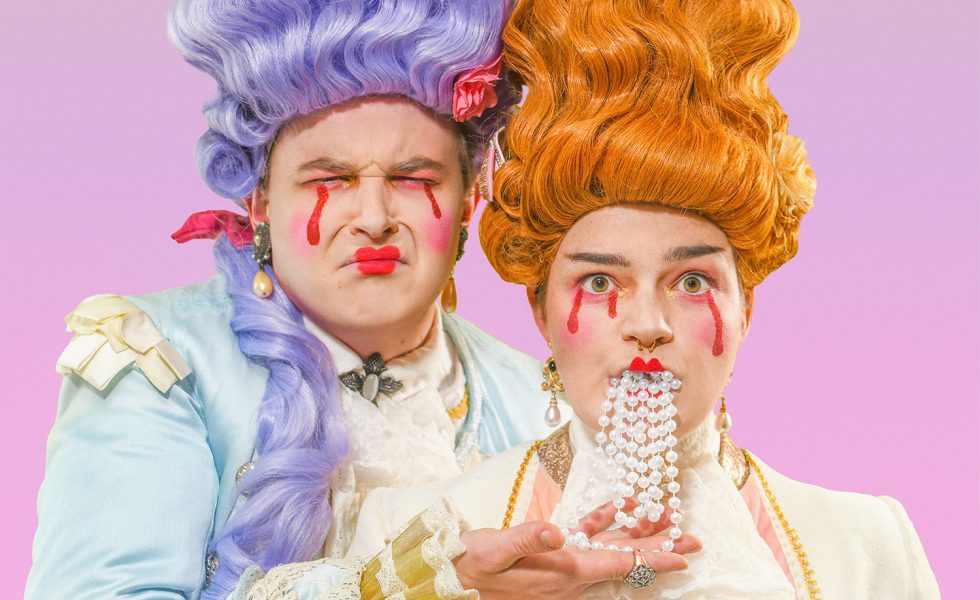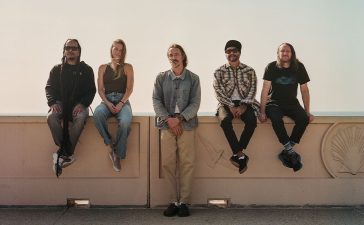Welcome to BLUNT’s experimental new column Beyond The Beat, where we catch up with some of our favourite bands and artists to chat about anything and everything except their music. The idea is simple: we’re keen to learn more about what our faves get up to when they put the mic down. Is that hardcore hero a secret baking pro? Does old mate death-metal froth a good walk through the botanical gardens on his Wednesday mornings? Or miss popstar supreme and her secret knack for bare-hand hunting – is it true? Let’s find out!
From the gauzy pseudo-disco prongs of ‘DFTM’ to the punchy math-pop poignancy of ‘Robert Smith’, God I’m Such A Mess – the debut album from Melbourne-via-Wollongong ‘bubblegum punk’ duo Cry Club, fresh on shelves via Best & Fairest – is a blindingly bright, topsy-turvy rollercoaster ride through a kaleidoscope of dance beats, punk riffs, and vocal quips that feel as homely on the band’s bangers as they would in a campy off-Broadway musical.
At the record’s core – as its cover art makes immediately clear – is its emphatic theatricality. The duo are unapologetically bold in their eccentricity, drawing as much influence from drag shows and batshit crazy anime (the really obscure stuff, not your standard Yu-Gi-Ohs or Pokémons) as they do from bands like LCD Soundsystem and The Cure.
In fact, their mutual love for anime is somewhat to thank for Cry Club’s existence altogether: singer Heather Riley and guitarist Jonathan “Jono” Tooke met on a uni-organised plane ride en route to Japan, where they bonded over the series finale of Cartoon Network’s (phenomenally underrated) Over The Garden Wall. Connecting further over their fandom for Evangelion – which was celebrating its 15th anniversary in Japan, meaning advertisements and tie-in products and branded pachinko machines dotted every other street corner – a lifelong bond was formed.
Chat with either member of Cry Club for more than a couple minutes and the topic of anime is sure to come up, either deliberately or by virtue of some sly, over-the-shoulder reference. Riley and Tooke are both unashamedly massive weebs – and so, naturally, a Zoom call where anime was the sole topic on the docket spun off from a few quick questions into a deep-dive down the (surprisingly convoluted) rabbithole of the art form’s A to Z, exploring lores, separating the fun from the fucked up, and examining how Western audiences en masse became so dedicated with such an innately foreign form of entertainment.
What was your entry point into the world of anime?
Jono: I think for me, it’s just been pervasive, all throughout my entire life. Dragon Ball Z was obviously gigantic when I was a kid, but I was also into a lot of things like Cardcaptor Sakura. It’s about a magical girl who fights monsters, but it’s also about fashion… Actually, saying that out loud is making me realise, I think I just like a lot of anime about fashion.
Heather: It’s so good because the characters change outfits in every episode, so you’re like, “Ooh!” They put a lot of thought into the designs. I love it.
Jono: That was my entry point. I started off with Cheez TV, and then at one point when I was a kid we had a [bootleg] version of Austar, and I remember staying up late for Adult Swim, which was the anime bracket on Cartoon Network after 11pm. I watched a lot of classic, ‘90s-era anime through that.
Heather: My entry point was also all the Cheez TV stuff, but the first thing I consciously got into… It was actually a manga – I got super into Fruits Basket, and then from there it was all downhill [laughs]. Fruits Basket is a very cult-type series, and if you mention it to people, they either don’t know about it or it’s ruined their life – there’s no in-between.
Jono: I think the classic thing for people who watch anime is the three-or-four-episode rule: just give it a three or four episode runway, and if you vibe those three or four episodes, continue watching. If you don’t, that’s fine – there’s plenty of other stuff. I feel like a lot of people are initially turned away because it’s animated, but most of it’s aimed at adults – or, like, teenagers and up.
Heather: But that’s also one of the misfires that happens with anime when it goes to a Western audience, especially through something like Cheez TV – everyone’s like, “It’s a kid’s show!” One Piece isn’t really a kid’s show. “Oh, but there’s pirates!” No. And shows like Naruto – they ended up always having to cut it off when it got too intense and violent. I’d wake up as a kid and be like, “Fuck yeah, Naruto!” And then it would just not be on TV anymore because it got too violent for the programmers.
Jono: Yeah, Dragon Ball Z is violent as fuck. I remember they had to edit out all the blood. And I think that’s a really interesting thing about anime, because most of us – especially in Western countries – are exposed to animation through specifically kid-based content. The earliest animated stuff I watched would’ve been early Disney movies, so to see that medium be used to tell a wider variety of stories is a really interesting thing. One of the shows that we’ve both been obsessed with lately is Jojo’s Bizarre Adventure – which, if you’re not already into anime, is an amazing in-point. It started in the ‘80s, and it kind of set up a lot of how anime and manga work as modern storytelling devices. And it’s just, like, the gayest show in the world. The more fashionable and hot someone is, the more powerful they are.
Heather: Yes! It’s so good – everyone is super eccentric and camp, and everyone wears this weird stuff and acts completely strange, but nobody is ever like, “That outfit’s a bit weird, bro.” Everyone’s just like, “Alright!”
Jono: You’ll have the biggest macho men wearing, like, just a harness, or the craziest deep-V cut singlet. And you’re just watching it like, “What the fuck?”
Heather: But that’s part of why it’s so good, because the fact that nobody reacts to any of the weird outfits and stuff tells you that, like, this is just normal for this universe. People just dress like that – people just act like that. It’s a really good series! It ruined my life!
Jono: Each season is also, like, potentially a continuation, but also its own individual narrative. It’s like an anthology – part one is essentially Shakespearian drama with vampires and fighting, and part two is just the dumbest goofball fighting.
Heather: HIMBO NATION!
Jono: Literally, if you look up the word ‘himbo’, the character from part two is the first thing that shows up.
Heather: He’s my favourite.
Jono: And it just gets weirder and weirder from there. Part seven is like a race across the United States on horseback, and the final boss is the President of the United States. It’s truly ridiculous – highly recommended.
I feel like anime is one of the very few things to have genuinely transcended the barriers between Eastern and Western cultures – moreso than virtually any other form of entertainment. What is it about anime that you think has made it such a cultural phenomenon here in the West?
Jono: There was that boom in the late ‘90s where Pokémon was the biggest property in the world, so all those companies were like, “Let’s take everything from Japan and translate it to English!” There’s this show called Ghost Stories – it’s a hard watch in some ways, but in others it’s the most ridiculous thing. It’s a show that completely failed in Japan, but they needed to make their money back so they were like, “Okay, we’ll translate this to English and see if we can get it sold in the States or something.” What ended up happening was that it landed in the hands of someone who got told, “Do whatever you need to do to make this make money.” And it was handed to a gay improv comedy writer. And that show… There are clips on YouTube where the actors of Ghost Stories are just improvising jokes and changing characters around. Like there’s like this kid, and they just changed the kid to go, “[dramatic gibberish]” the entire time. So they’ll be in the middle of a big, scary scene, and the kid just starts going “[dramatic gibberish]” in the corner. And you’re just like, “What the fuck is going on!?”
Heather: It’s so dumb. I can’t believe it exists. There’s a kind of culture around anime with abridged series, and it felt like an abridged series before they were a thing.
Jono: In the early days of YouTube, there was a whole community of people who would take anime clips and re-dub them for comedy purposes. There’s a whole running series of abridged Dragon Ball Z episodes, and there’s, like, a million versions of those.
I feel like every one in three stories about Cry Club – this one included, obviously – will reference how you became friends on a uni trip to Japan. But none of them tell the most important follow-up part of that story: what was it like adventuring around Japan as anime fans?
Jono: It was fucking crazy!
Heather: It was so good!
Jono: Evangelion is such a giant thing in Japan, and they were celebrating its 15th anniversary, so everywhere you looked was something Evangelion-themed. If you’ve never seen it, Evangelion is pretty much everything to do with anime condensed into the one thing. It’s also probably the most controversial anime of all time – the end of the animated series resulted in the creator getting a wash of death threats.
Heather: It was like the OG Game Of Thrones ending.
Jono: If you’re looking for a crash course in anime, Jojo’s Bizarre Adventure is a fun place to start, and then Evangelion is, like, the thing that will become your favourite piece of media.
Heather: It’s beautiful. Depressing, but beautiful.
Jono: It uses giant fighting robots to tell an incredibly personal story, which is also incredibly harrowing at points. Episode 24 has my favourite shot of, like, any TV or film – it lasts for a whole minute, and it’s just one static shot. The animation doesn’t even change – it’s totally static, nobody blinks, and they’re just terrified about what’s going to happen. And it’s the most amazing thing in the world. Evangelion is one of those things that people watch too young and they go, “Woah, anime is fucked up!” And it’s like, “Well… Yeah it is, but it’s phenomenal.” And it’s such an enormous thing in Japan.
Heather: People on YouTube have done videos where they’re like, “Can I survive for a while just buying Evangelion-branded products?” Like, there’s Evangelion food, drinks, tools, shaving kits… It’s crazy. And it was so good – I think that’s part of why we became such immediate close friends, because we both were always like, “I love that anime! [Excited squeal]!”
Jono: “[Excited squeal]!”
Heather: “[Excited squeal]!” There were a couple of other people who were also really into it, but Jono and I liked all the same shit, so it was really fun. Attack On Titan was another anime that I was really into at the time, which was really big there – every second thing was either Evangelion or Attack On Titan. And then there was Terra Formars – everyone on that trip is forever linked by this very cursed show that came out and was really heavily advertised at the time, called Terra Formars. It’s about these people who go to Mars, and there’s, like, scary cockroaches everywhere.
Jono: Big, buff cockroaches that kill people!
Heather: I cannot stress how big and buff these cockroaches are. They look like apes! But they’re cockroaches!
Jono: And they’re incredibly violent! The show is about people reclaiming Mars from the killer cockroaches.
Heather: And at one point they’re like, “Y’know what would help us beat these cockroaches? IF WE WERE BUGS!” It’s horrible!
Jono: It’s the most gratuitous… Just… Like… It’s fucked. And it was being advertised everywhere – we would be on the train going into Tokyo, and then the entire train would be covered in Terra Formars manga panels.
Heather: The trip was split between the people who picked up the manga versus the people who watched the anime – which are apparently two very different stories.
Which one of them is more fucked?
Jono: I think the manga. You can get away with a lot more in manga because you don’t have to go past TV censors. Like, a lot of Terra Formars, when I watched it – I don’t know what platform I was watching it on, but there were just points where half the screen was just censored black because of the violence in it.
Heather: The art of the page turn is something really specific in manga, too – and with Terra Formars, you’d go, “What’s on the next page? BUFF COCKROACH!” The whole page would just be this intensely detailed, brutal looking cockroach face. You have to look it up – I cannot describe how fucked up these fucking cockroaches are.
Jono: So yeah, Japan was great.









